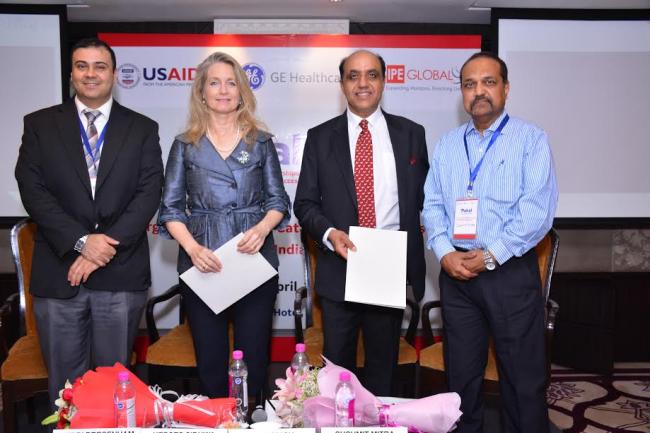
USAID, IPE Global & GE Healthcare announce partnership to improve healthcare services for 2.5 million urban poor
Terri Bresenham, President and CEO of GE Healthcare’s Sustainable Healthcare Solutions, and L. M. Singh, Project Director, PAHAL, signed a Memorandum of Understanding in the presence of Xerses Sidhwa, Director, Health, USAID/India.
Project PAHAL, implemented by IPE Global with assistance from the U.S. Agency for International Development (USAID), responds to the Government of India’s priorities of reducing morbidity and mortality among women and children in the underserved urban communities by leveraging private markets and community engagement to promote healthy behaviour change, improve access to affordable primary healthcare, and reduce out-of-pocket expenses.
The partnership launch will utilize transformational medical technology, solutions and services to meet the needs of India’s urban poor, and forms a part of Project PAHAL.
Speaking at the launch, L. M. Singh, Project Director, PAHAL, said: “Private sector led social enterprises provide a huge untapped opportunity to address healthcare needs of the urban poor. Pahal in a short period has built partnerships that provide a platform to serve healthcare needs of over 20 million urban poor in several high priority states of India, in line with National health policy and priorities. We will provide catalytic support to innovative business models which will make health care patient centric with improved access at reduced cost. Our partnership with GE Healthcare is a significant milestone in this journey as it complements our efforts that aim to provide world class quality health solutions for the most deserving at affordable prices, with a particular focus on the health of women and children."
“GE Healthcare is delighted to partner with IPE Global on project PAHAL in creating a sustainable model that will address the healthcare need gap among urban poor in India,” said Milan Rao, President & CEO, GE Healthcare, South Asia and Managing Director, Wipro GE Healthcare. “Decades of understanding the Indian market and years of investment in innovation has led to our Affordable Care Portfolio which is geared towards addressing some of the toughest healthcare challenges in India and globally, including lowering maternal and infant mortality. Affordability, portability, durability and ease of use of these technologies ensures that we are able to drive access to quality healthcare in a significant way,” said Singh.
Elaborating on USAID’s global health programs and their strategic priorities of building sustainable and resilient health systems across the globe, Xerses Sidhwa, Director, Health, USAID/India, said: “USAID aims to develop sustainable health solutions through facilitating strategic partnerships such as this one between GE Healthcare and PAHAL. USAID has a track record of facilitating these types of partnerships and has assisted with the development of the social franchising model of Merrygold clinics in Uttar Pradesh. This has resulted in 700 private clinics currently and will expand to 3,000 clinics over the next four years through PAHAL’s support. These clinics are able to reach more women and children among the urban poor who are the most vulnerable.”
Project PAHAL and GE Healthcare through this partnership will strengthen the network of private healthcare business by increasing access to need based solutions that enhances and strengthens the service offerings, revenue, sustainability to meet the health impact. Both the teams have been assessing and building the solutions for network of private hospitals in Rajasthan and will expand to other states including Assam, Odisha, Andhra Pradesh, Haryana, Delhi, Telangana, Jharkhand, Madhya Pradesh, Punjab, Uttarakhand and West Bengal.
Support Our Journalism
We cannot do without you.. your contribution supports unbiased journalism
IBNS is not driven by any ism- not wokeism, not racism, not skewed secularism, not hyper right-wing or left liberal ideals, nor by any hardline religious beliefs or hyper nationalism. We want to serve you good old objective news, as they are. We do not judge or preach. We let people decide for themselves. We only try to present factual and well-sourced news.







